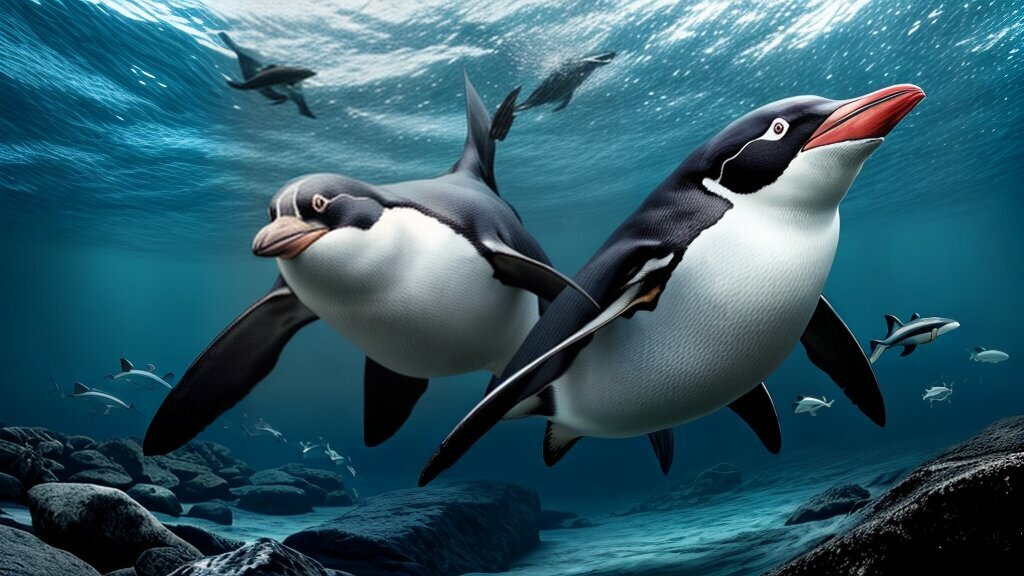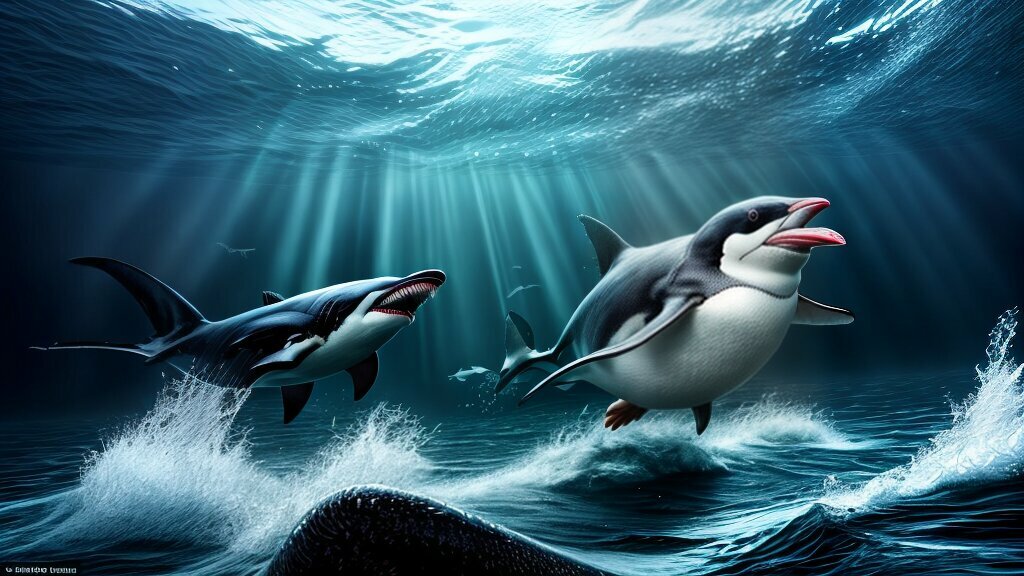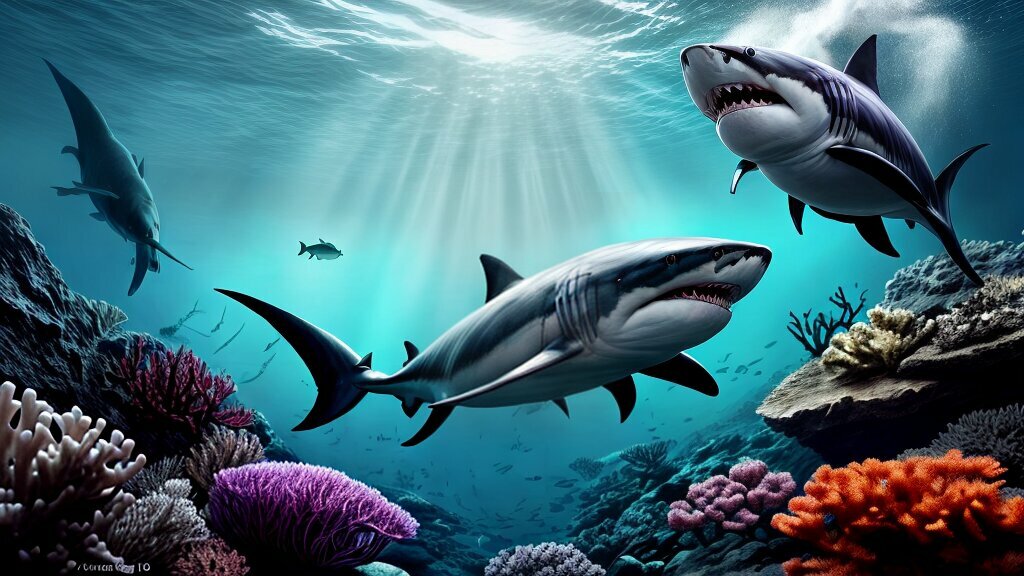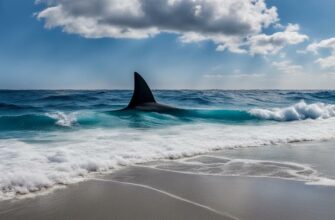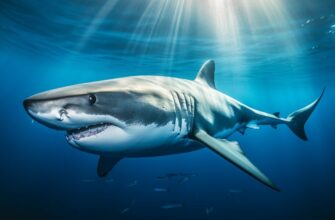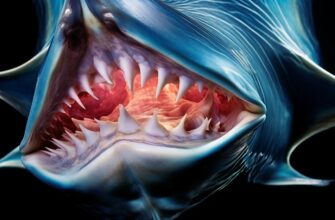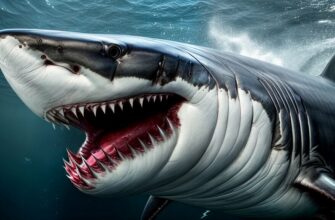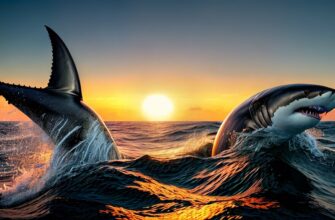Sharks are fascinating creatures that have captured the human imagination for centuries. As apex predators of the ocean, they are known for their sharp teeth and powerful hunting abilities. But do sharks eat penguins? This is a question that has intrigued many people, and in this section, we will explore the answer in detail.
Before we dive into the question of whether sharks eat penguins, let’s first examine their feeding habits in general. Sharks are carnivorous, which means they feed on other animals. Their diet consists of a wide variety of prey, including fish, seals, sea lions, and even other sharks. They are opportunistic hunters, which means they will eat whatever prey is available to them.
Now, let’s address the question at hand: Do sharks eat penguins? The answer is yes, some shark species do prey on penguins. However, not all sharks eat penguins, and their interactions with these flightless birds vary.
So, how do sharks interact with penguins in the food chain? This is a complex topic that we will explore in more detail in the following sections. We will look at how sharks function as predators in the ocean, how penguins survive against shark attacks, and whether all shark species eat penguins.
- Key Takeaways:
- Sharks as Predators in the Ocean
- Shark Dietary Habits
- Predators of Penguins
- Penguin Survival Against Shark Attacks
- Do All Shark Species Eat Penguins?
- Conclusion
- Stay Curious
- FAQ
- Q: Do sharks eat penguins?
- Q: What are the dietary habits of sharks?
- Q: Do penguins have survival strategies against shark attacks?
- Q: Do all shark species eat penguins?
Key Takeaways:
- Sharks are carnivorous and feed on a variety of prey.
- Some shark species do prey on penguins.
- The interactions between sharks and penguins in the food chain are complex.
Sharks as Predators in the Ocean
Sharks are apex predators of the ocean and play a critical role in the marine ecosystem. There are over 500 species of sharks, each with unique dietary habits and hunting techniques.
Sharks have a diverse diet, ranging from small fish and crustaceans to larger marine mammals and even other sharks. Some species, such as the great white shark, are known to prey on penguins. These predators use stealth and speed to ambush their prey, often swimming at high speeds to reach their target.
The interaction between sharks and penguins in the food chain is complex. While sharks are predators of penguins, these flightless birds have developed adaptations and behaviors to survive against these formidable predators. For example, penguins often form large groups for protection, and some species have evolved the ability to swim at high speeds to evade shark attacks.
Shark Dietary Habits
Sharks have a diverse range of dietary habits, depending on their species and environment. Some species, such as the hammerhead shark, have a diet that consists primarily of smaller fish, octopuses, and crustaceans. Other species, such as the tiger shark, have a more varied diet that includes fish, seals, turtles, and even garbage.
Sharks use a variety of hunting techniques to capture their prey, including biting, ramming, and swallowing whole. Some species, such as the whale shark, are filter feeders that consume plankton and small fish by swimming with their mouths open.
Predators of Penguins
Sharks are not the only predators of penguins. Other marine animals, such as seals and killer whales, also prey on these flightless birds.
However, not all shark species eat penguins. Some species, such as the nurse shark and the blacktip shark, have a diet that consists primarily of smaller fish and do not typically prey on penguins.
It is important to understand the dynamics of marine predation and the interactions between predators and prey. By studying the dietary habits and hunting techniques of sharks and other marine animals, we can gain a better understanding of their role in the marine ecosystem and the conservation efforts needed to protect them.
Penguin Survival Against Shark Attacks
As we’ve explored earlier, penguins are often on the menu for some species of sharks, making them vulnerable to attacks in the water. However, these flightless birds have developed several strategies to escape and defend themselves against their predators.
One of the most common tactics employed by penguins is to form large groups in the water. This formation makes it difficult for sharks to single out an individual penguin for attack. In addition, penguins are capable of swimming at high speeds, allowing them to outrun most sharks. They can also dive deep underwater, which is another way to avoid detection.
Some species of penguins have physical adaptations that make them less appetizing to sharks. For instance, the Magellanic penguin has a dark back and white belly, which acts as camouflage in the water, making it harder for sharks to spot them from below. Similarly, the Little blue penguin has a layer of oily feathers that make it difficult for sharks to grab hold of them.
When all else fails, penguins may engage in physical combat with their attackers. They will use their sharp beaks and flippers to strike the shark’s eyes, nose or gills, which can be lethal or at least enough to deter the predator.
It is interesting to note that not all penguins are equally at risk of shark attacks. According to research, the African penguin is one of the most vulnerable to predation, likely due to its smaller size and slower swimming speed. On the other hand, Emperor penguins have evolved to be too large to be a practical prey item for most shark species.
Overall, penguins have developed a range of strategies to protect themselves from shark attacks, allowing them to thrive in their marine habitats.
Do All Shark Species Eat Penguins?
Sharks are known for their diverse dietary habits, and while some species do prey on penguins, not all sharks do so. The variety of shark species in the ocean means that each one has unique dietary preferences and hunting techniques.
Most commonly, penguins are preyed upon by species such as great white sharks, bull sharks, and tiger sharks. These sharks are apex predators and are known to hunt larger prey, making penguins a potential target.
However, not all sharks are predators of penguins. For example, some species, such as whale sharks, feed primarily on plankton and small fish and are unlikely to attack penguins. Similarly, nurse sharks are bottom feeders and prefer crustaceans and stingrays over penguins.
| Shark Species | Dietary Preferences |
|---|---|
| Great White Shark | Hunts larger prey, including penguins |
| Tiger Shark | Opportunistic feeder, preys on larger animals like penguins |
| Bull Shark | Aggressive predator, feeds on various marine life including penguins |
| Whale Shark | Feeds primarily on plankton and small fish, unlikely to attack penguins |
| Nurse Shark | Bottom feeder, prefers crustaceans and stingrays over penguins |
The relationship between sharks and penguins is complex, and understanding the dietary habits of different shark species is crucial for studying the dynamics of their shared ecosystem.
In conclusion, while some shark species do prey on penguins, not all sharks do so. The dietary preferences of different shark species vary widely, and studying these preferences is essential for understanding marine ecology.
Conclusion
After exploring the fascinating world of sharks and penguins, we’ve gained a deeper understanding of their feeding habits, interactions, and dynamics in marine ecosystems. As we’ve seen, sharks are apex predators that play a vital role in the food chain, and their dietary preferences vary depending on the species and region.
While it may seem like penguins are easy prey for sharks, these flightless birds have developed a range of strategies to survive in their shared habitat. From swimming in groups to using camouflage and agility to evade predators, penguins are surprisingly resilient against shark attacks.
It’s important to note that the relationship between sharks and penguins is complex and requires careful consideration. As we continue to study these fascinating creatures, we must remember that every species has a role to play in maintaining the delicate balance of our oceans.
Stay Curious
As we’ve seen, the world of marine ecology is full of surprises and wonder. By staying curious and continuing to explore the diverse and complex interactions between different species, we can deepen our understanding and appreciation of our planet’s incredible biodiversity.
FAQ
Q: Do sharks eat penguins?
A: While sharks have a diverse diet, including various fish, seals, and squid, they typically do not target penguins as a primary food source. Penguins tend to inhabit colder regions, far away from the typical habitats of most shark species. However, there have been rare instances where sharks have been known to prey on penguins, especially during certain migratory periods. Overall, the relationship between sharks and penguins in terms of predation is not as common as some might think.
Q: What are the dietary habits of sharks?
A: Sharks have a wide range of dietary preferences. Some species are specialized predators, hunting specific types of prey, while others are opportunistic feeders and will consume almost anything they come across. Their diet can include fish, seals, sea turtles, squid, and other marine creatures. Sharks are known for their ability to adapt to different food sources depending on their environment and availability of prey.
Q: Do penguins have survival strategies against shark attacks?
A: Penguins have developed various strategies to survive against shark attacks. They rely on their agility and diving abilities to escape from approaching sharks, using their wings as flippers to propel themselves quickly through the water. Additionally, penguins often form large groups when swimming, decreasing the likelihood of an individual being targeted by a shark. Some species of penguins also employ camouflage techniques to blend in with their surroundings, making it harder for predators, including sharks, to spot them.
Q: Do all shark species eat penguins?
A: Not all shark species eat penguins. While there are instances where certain species of sharks have been observed preying on penguins, it is not a common occurrence. Sharks have diverse dietary preferences, and most species have evolved to feed on specific types of prey that are more abundant or easier to catch in their respective habitats. Penguins are not a primary food source for the majority of shark species, as their diets mainly consist of fish and other marine animals.


